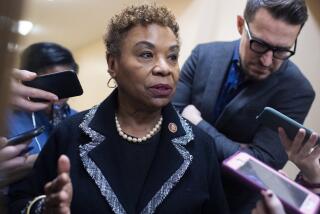Richard C. Holbrooke’s last mission
- Share via
Richard C. Holbrooke, who died Monday at 69, was most often described in terms of his larger-than-life style. He had protean energy, bulldozer tenacity and an always visible ego, all of which he used in relentless pursuit of what he felt was America’s duty: to try to fix the world’s problems.
But the last time I had a conversation with Holbrooke, he sounded frustrated.
“How does this thing end? I don’t know,” he said last summer, talking about the overwhelming obstacles the U.S. faces in Afghanistan and Pakistan. “It is really the toughest thing that I’ve ever attempted.”
And that, for Holbrooke, was no small admission.
Holbrooke began his diplomatic service in Vietnam, a tragic failure of American foreign policy. But instead of concluding, as others did, that the United States should do less, he concluded that the country should learn to use its power more effectively.
Holbrooke devoted much of his life to trying to demonstrate to his fellow Democrats that American power could be wielded unapologetically and effectively.
He saw Americans go through several bouts of “declinism” — the view that U.S. power was bound to wane and that American diplomacy would have to reduce its ambitions as a result — but he refused to believe it.
In 2008, before the presidential election but with the economy already in trouble, he wrote: “The next president will inherit leadership of a nation that is still the most powerful in the world … a nation that could, and must, again inspire, mobilize and lead the world.
“His core challenge will be nothing less than to re-create a sense of national purpose and strength after a period of drift, decline and disastrous mistakes.”
As a practitioner of diplomacy, Holbrooke’s strategies proceeded from that combination of purpose and bravado. He constantly urged action, not hesitation — an entrepreneurial bent that sometimes prompted more cautious diplomats to describe him as a bull in a china shop.
His bare-knuckled willingness to threaten as well as promise, and to negotiate with villains, helped him achieve his greatest triumph, the 1995 peace agreement that ended the war in Bosnia-Herzegovina.
He later called Yugoslav President Slobodan Milosevic, with whom he bartered over the fate of Bosnia, a “monster,” but added: “Sometimes you have to negotiate with murderers.”
On what he presciently called his “last mission”— his job as President Obama’s special envoy to Afghanistan and Pakistan — Holbrooke never got a chance to try his negotiating skills on Afghanistan’s Taliban. Holbrooke was in favor of negotiations with the insurgents; if a possible path opened toward ending the war, he said, the United States should be “opportunistic.”
But no such negotiations were in view, so Holbrooke’s main focus was on turning the prickly U.S. relationship with Pakistan — Afghanistan’s neighbor and the Taliban’s refuge — into a stable strategic alliance.
Indeed, one of his main contributions to the Obama administration’s policy was his insistence that the most important country in that part of the world wasn’t Afghanistan, with 30 million people, but Pakistan, with 180 million people and nuclear weapons.
He helped coin the term “AfPak” to describe the two countries as a single problem, then switched to “PakAf” to correct the priority. Eventually, after Pakistanis said they disliked being lumped with their smaller, more backward neighbor, he dropped both terms.
Another Holbrooke contribution was his vigorous insistence that the United States should stop spending time and money on an unpopular and unsuccessful campaign to eradicate Afghanistan’s opium poppy crop — a recommendation that was radical at the time but is now largely embraced as common sense.
But much of his job turned out to be a long, unglamorous series of bureaucratic battles to get U.S. economic aid and advisors flowing into Afghanistan and Pakistan to win hearts and minds, just as had once been tried in Vietnam. “Contrary to what some people believe, I spend a lot of my time on economic issues,” he told me.
And he was frustrated, friends said, both by the intractability of the problems he was trying to solve and by his own limited influence in the Obama administration. He was close to Secretary of State Hillary Rodham Clinton, whom he supported for president in 2008, but was the object of thinly veiled criticism from Obama’s White House staff, who suspected him of talking too much to the news media.
Holbrooke wasn’t a dove; he was a realist. He believed the United States needed to lower its sights in Afghanistan to find an outcome that was achievable at reasonable cost. But he still believed the United States needed to remain involved in both Afghanistan and Pakistan for years to come.
It was characteristic that he was still talking about the problem even as he was taken to the emergency surgery from which he never recovered.
“You’ve got to relax,” one member of his medical team told him, according to State Department spokesman P.J. Crowley. “I can’t relax,” Holbrooke replied. “I’m worried about Afghanistan and Pakistan.”
More to Read
Sign up for Essential California
The most important California stories and recommendations in your inbox every morning.
You may occasionally receive promotional content from the Los Angeles Times.











